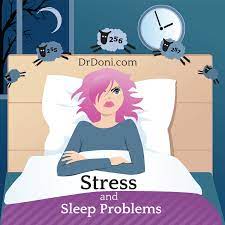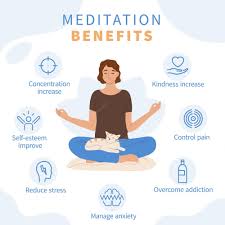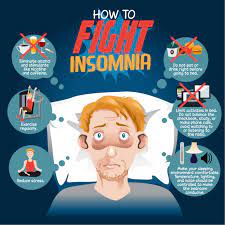The Relationship Between Stress and Insomnia
Stress and insomnia often go hand in hand, creating a vicious cycle that can be challenging to break. When we experience stress, our bodies release hormones like cortisol that can disrupt our sleep patterns. This can lead to difficulty falling asleep, staying asleep, or achieving restful sleep.
Chronic stress can have a significant impact on our overall well-being, including our ability to get a good night’s rest. The constant activation of the body’s stress response system can make it difficult for us to relax and unwind when it’s time to go to bed.
On the other hand, lack of quality sleep can also contribute to increased stress levels. When we don’t get enough restorative sleep, our bodies and minds are not able to recover fully, leading to irritability, difficulty concentrating, and heightened emotional responses.
It’s essential to address both stress and insomnia together to break the cycle. Strategies such as relaxation techniques, mindfulness practices, regular exercise, and maintaining a consistent sleep schedule can help reduce stress levels and improve sleep quality.
In some cases, seeking professional help from a therapist or healthcare provider may be necessary to address underlying issues contributing to stress and insomnia. Cognitive-behavioral therapy for insomnia (CBT-I) is a proven treatment that focuses on changing behaviors and thoughts related to sleep.
By recognizing the relationship between stress and insomnia and taking proactive steps to manage both effectively, we can improve our overall health and well-being. Remember that self-care is essential in maintaining balance and resilience in the face of life’s challenges.
9 Effective Strategies to Overcome Stress-Related Insomnia
- Establish a regular sleep schedule
- Create a relaxing bedtime routine
- Limit exposure to screens before bed
- Avoid caffeine and heavy meals close to bedtime
- Engage in regular physical activity during the day
- Practice relaxation techniques such as deep breathing or meditation
- Ensure your sleep environment is conducive to restful sleep
- Limit naps during the day, especially in the evening
- Consider seeking professional help if insomnia persists
Establish a regular sleep schedule
Establishing a regular sleep schedule is a crucial tip for managing stress-related insomnia. By going to bed and waking up at the same time every day, our bodies can regulate their internal clock, known as the circadian rhythm. This consistency helps improve the quality of our sleep by ensuring that we get enough rest each night. Additionally, maintaining a regular sleep routine can reduce stress and anxiety levels, making it easier to relax and fall asleep naturally. Prioritizing a consistent bedtime routine can be a simple yet effective strategy in combating stress-induced insomnia and promoting overall well-being.
Create a relaxing bedtime routine
Creating a relaxing bedtime routine can be a powerful strategy to combat stress-induced insomnia. By establishing calming activities before bed, such as reading a book, taking a warm bath, or practicing gentle yoga, you signal to your body that it’s time to unwind and prepare for sleep. This routine helps reduce stress levels and promotes relaxation, making it easier to transition into a restful night’s sleep. Consistency is key, so incorporating these soothing rituals into your nightly regimen can lead to improved sleep quality and overall well-being.
Limit exposure to screens before bed
Limiting exposure to screens before bed is a valuable tip for managing stress-related insomnia. The blue light emitted by electronic devices can interfere with the production of melatonin, the hormone responsible for regulating our sleep-wake cycle. By reducing screen time before bedtime, we can create a conducive environment for relaxation and signal to our bodies that it’s time to wind down. This simple adjustment can help improve sleep quality and contribute to a more restful night’s rest, ultimately reducing the impact of stress on our sleep patterns.
Avoid caffeine and heavy meals close to bedtime
Avoiding caffeine and heavy meals close to bedtime is a crucial tip for managing stress-related insomnia. Caffeine is a stimulant that can interfere with your ability to fall asleep and stay asleep, even hours after consumption. Similarly, heavy meals close to bedtime can lead to indigestion and discomfort, making it difficult to relax and drift off to sleep. By steering clear of these sleep-disrupting substances and foods in the hours leading up to bedtime, you can create a more conducive environment for restful sleep and better manage the impact of stress on your sleep patterns.
Engage in regular physical activity during the day
Engaging in regular physical activity during the day can be a powerful tool in managing stress and improving sleep quality for those experiencing stress-induced insomnia. Exercise helps release endorphins, which are known as “feel-good” hormones that can reduce feelings of anxiety and stress. Additionally, physical activity promotes better circulation, increases energy levels, and can contribute to a more restful night’s sleep by helping regulate the body’s natural sleep-wake cycle. By incorporating exercise into your daily routine, you not only take care of your physical health but also support your mental well-being, ultimately aiding in combating stress-related sleep disturbances.
Practice relaxation techniques such as deep breathing or meditation
To alleviate the impact of stress on insomnia, it is beneficial to incorporate relaxation techniques like deep breathing or meditation into your daily routine. These practices can help calm the mind, reduce tension in the body, and promote a sense of inner peace. By engaging in deep breathing exercises or meditation before bedtime, you can create a tranquil environment that signals to your body it is time to unwind and prepare for restful sleep. Consistent practice of these relaxation techniques can not only improve your sleep quality but also enhance your overall well-being by managing stress more effectively.
Ensure your sleep environment is conducive to restful sleep
Creating a sleep environment that promotes restful sleep is crucial in managing stress-related insomnia. Ensuring your bedroom is dark, quiet, and at a comfortable temperature can help signal to your body that it’s time to unwind and prepare for sleep. Removing distractions such as electronic devices and incorporating calming elements like soft lighting or soothing sounds can further enhance the relaxation process. By prioritizing a sleep-friendly environment, you set the stage for better quality sleep and improved overall well-being.
Limit naps during the day, especially in the evening
Limiting naps during the day, particularly in the evening, can be beneficial in managing stress-related insomnia. While a short nap can provide a quick energy boost and improve alertness, napping too close to bedtime can disrupt your natural sleep-wake cycle. This can make it harder to fall asleep at night and lead to fragmented or shallow sleep. By avoiding late-day naps and focusing on establishing a consistent sleep routine, you can help regulate your body’s internal clock and promote better quality sleep.
Consider seeking professional help if insomnia persists
It is important to prioritize your well-being and seek professional help if insomnia persists despite trying various strategies to improve your sleep. Persistent insomnia could be a sign of underlying issues that may require specialized treatment or therapy. A healthcare provider or sleep specialist can offer personalized guidance and interventions to help you address the root causes of your sleep disturbances and develop a tailored plan for better sleep health. Remember, seeking professional help is a proactive step towards managing stress-related insomnia and improving your overall quality of life.




